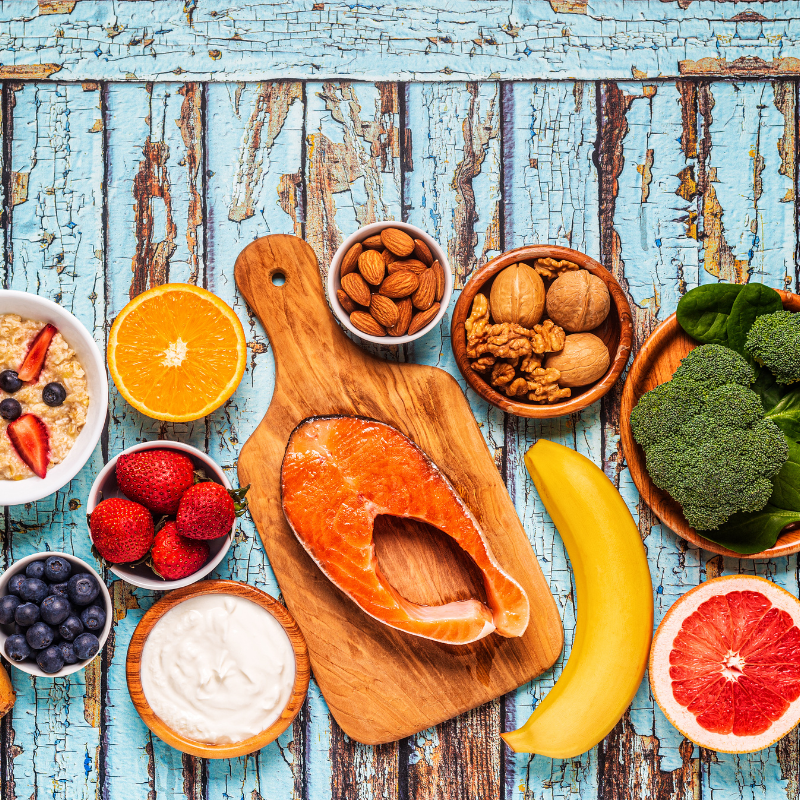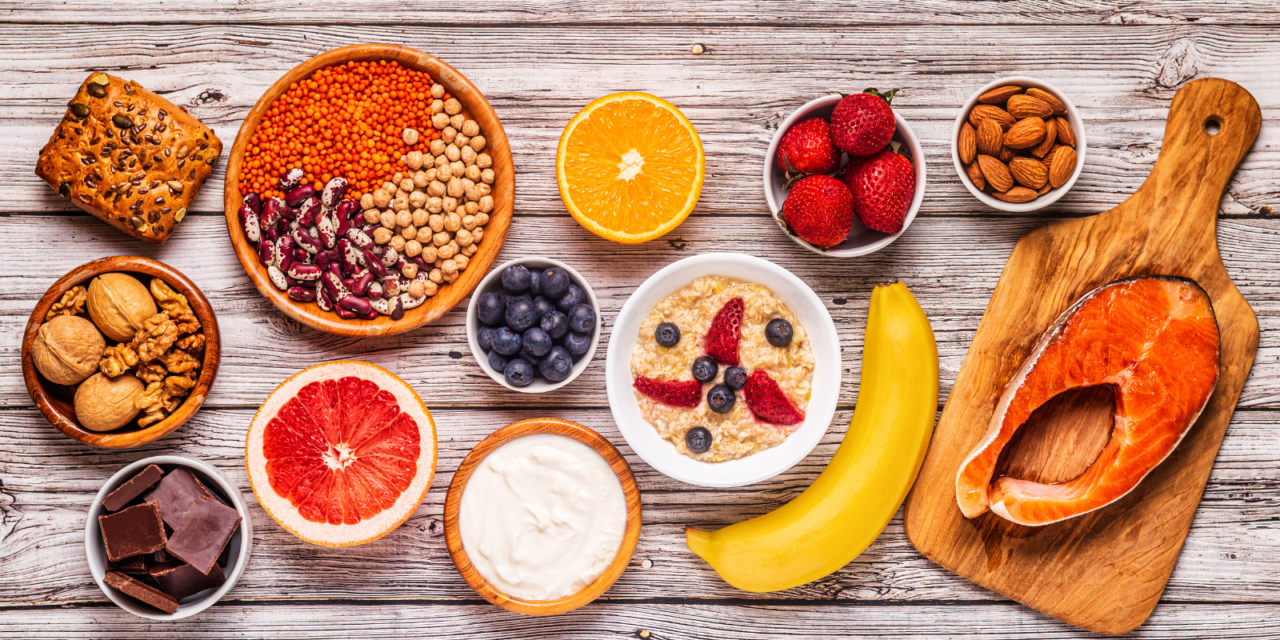What Are The Best Foods That Help With Mental Health? We List The Top 20
By: A Good Place Therapy
“Let food be thy medicine,” once said Hippocrates, echoing a sentiment that our ancestors instinctively understood.
The link between our diet and mental health is profound, and recent research only confirms what was inherently known.
Here’s an exploration of 20 foods that are not only delicious but also serve as mental health allies.
-
Fatty Fish (e.g., salmon, mackerel, sardines)
- Interesting Fact: A 3.5-ounce serving of salmon provides a full day’s intake of omega-3s.
- Benefit: Bolsters cognitive function and mood stabilization.
- Mechanism: Omega-3s like DHA aid brain cell communication and protect against age-related decline.
-
Walnuts
- Interesting Fact: Walnuts somewhat resemble the human brain, and they’re nature’s brain-boosters!
- Benefit: They encourage better brain function.
- Mechanism: Walnuts are loaded with ALA (a type of Omega-3) which promotes brain health.
-
Blueberries
- Interesting Fact: Blueberries are often referred to as “brain berries” by neuroscientists.
- Benefit: Sharpens cognitive abilities and memory.
- Mechanism: Packed with antioxidants that rejuvenate the brain and improve neuron communication.
-
Turmeric
- Interesting Fact: Turmeric has been used in Ayurvedic medicine for over 4,000 years.
- Benefit: Mood-enhancer and neuroprotective.
- Mechanism: Curcumin in turmeric boosts serotonin and dopamine levels, enhancing mood.
-
Whole Grains (e.g., quinoa, oats)
- Interesting Fact: Humans began cultivating grains around 10,000 years ago.
- Benefit: Steady energy supply, supporting sustained brain function.
- Mechanism: Slow glucose release helps in maintaining consistent brain energy.
-
Leafy Greens (e.g., kale, spinach)
- Interesting Fact: Ancient Greeks revered kale for its health benefits.
- Benefit: Boosts cognitive function.
- Mechanism: Folic acid, vitamin K, and antioxidants combat brain aging.
- Yogurt & Fermented Foods (e.g., kimchi, sauerkraut)
- Interesting Fact: Fermented foods have been dietary staples in cultures worldwide for millennia.
- Benefit: Elevates mood and reduces anxiety.
- Mechanism: Probiotics enhance gut health, affecting neurotransmitter production.
-
Dark Chocolate
- Interesting Fact: The Mayans called chocolate “xocolatl” or “bitter water”.
- Benefit: Immediate mood uplift and cognitive boost.
- Mechanism: Flavonoids and caffeine enhance focus and mood.
-
Eggs
- Interesting Fact: Eggs contain all 9 essential amino acids.
- Benefit: Supports memory and mood stabilization.
- Mechanism: Rich in choline, which boosts acetylcholine (neurotransmitter) production.
-
Beans (e.g., black beans, lentils)
- Interesting Fact: Lentils have been consumed by humans since prehistoric times.
- Benefit: Provides steady energy for brain function.
- Mechanism: Stabilizes blood sugar levels for sustained energy.
-
Avocado
- Interesting Fact: Aztecs believed avocados provided strength.
- Benefit: Promotes optimal brain function.
- Mechanism: Monounsaturated fats enhance blood flow to the brain.
-
Pumpkin Seeds
- Interesting Fact: Native Americans treasured pumpkin seeds both for dietary and medicinal purposes.
- Benefit: Fortifies brain health.
- Mechanism: Contains vital nutrients like magnesium, iron, and zinc.
-
Broccoli
- Interesting Fact: The name “broccoli” originates from the Italian word “broccolo”, meaning the flowering top of a cabbage.
- Benefit: Guards the brain against damage.
- Mechanism: Packed with antioxidants and vitamin K.
-
Tomatoes
- Interesting Fact: Tomatoes were believed to be poisonous in the early United States because they belong to the nightshade family.
- Benefit: Prevents brain cell damage.
- Mechanism: Lycopene, an antioxidant, protects against free-radical damage.
-
Oranges
- Interesting Fact: Oranges were once a luxury only the rich could afford.
- Benefit: Boosts mental performance.
- Mechanism: Vitamin C fights cognitive aging.
-
Green Tea
- Interesting Fact: Legend has it that tea was discovered when Chinese Emperor Shen Nong accidentally drank water with a dead tea leaf boiled inside.
- Benefit: Boosts alertness and focus.
- Mechanism: Caffeine and L-theanine synergy improve brain function.
-
Soy Products
- Interesting Fact: The first recorded use of soybeans dates back to 2838 B.C. in China.
- Benefit: Mood enhancement.
- Mechanism: Polyphenols elevate serotonin levels.
-
Nuts and Seeds (e.g., flaxseeds, almonds)
- Interesting Fact: Almonds are seeds, not nuts, from the fruit of the almond tree.
- Benefit: General brain health improvement.
- Mechanism: Packed with omega-3 and omega-6 fatty acids.
-
Poultry (e.g., chicken, turkey)
- Interesting Fact: Turkey contains tryptophan, often wrongly blamed for post-Thanksgiving sleepiness.
- Benefit: Assists in mood regulation.
- Mechanism: Tryptophan in poultry aids serotonin production.
-
Oysters
- Interesting Fact: Ancient Romans used to pay for their homes with oyster shells.
- Benefit: Boosts mood and cognitive function.
- Mechanism: High in zinc, vital for brain function.

Frequently Asked Questions
- Is food genuinely linked to mental health?
- Absolutely. Research indicates that certain foods can influence brain chemistry, inflammation, and overall cognitive function.
- Are there foods specifically targeted for depression?
- While not a replacement for medical treatments, foods like fatty fish and dark chocolate have mood-boosting properties.
- How do the gut and brain connect in terms of health?
- Via the gut-brain axis. A healthy gut can influence the production of neurotransmitters and reduce inflammation, thereby impacting mental health.
- Can I replace my mental health medication with these foods?
- No. While these foods help, they should complement, not replace, prescribed treatments. Consultation with a physician is key.
- How frequently should these foods be in my diet?
- A consistent, balanced intake is recommended, but specifics may vary depending on individual needs.
- Are there foods to avoid for mental well-being?
- Excess sugars, alcohol, and highly processed foods may negatively impact mental health.
- Can children also benefit from these foods?
- Certainly! A nutritious diet supports children’s cognitive and emotional development.
- Why are antioxidants good for the brain?
- They combat oxidative stress and inflammation, both of which can damage brain cells.
- Are there risks of over-consuming these foods?
- While they’re beneficial, moderation is crucial. For instance, excessive fish might lead to mercury exposure.
- How do I smoothly integrate these foods into my meals?
- Gradually include them in your meals, experimenting with recipes to ensure a diverse, balanced intake.
The connection between food and mood is undeniably deep. Nourishing our bodies with these superfoods not only ensures physical vitality but also mental vibrancy.
Still, it’s essential to recognize that diet is just one facet of overall well-being. Regular exercise, adequate sleep, stress management, and medical care play equally crucial roles. Always consider a holistic approach to mental health.
If you have any questions about our article, “What Are The Best Foods That Help With Mental Health? We List The Top 20” or need an online therapist in Ontario, feel free to chat with us on LiveChat, social media, or at [email protected].





